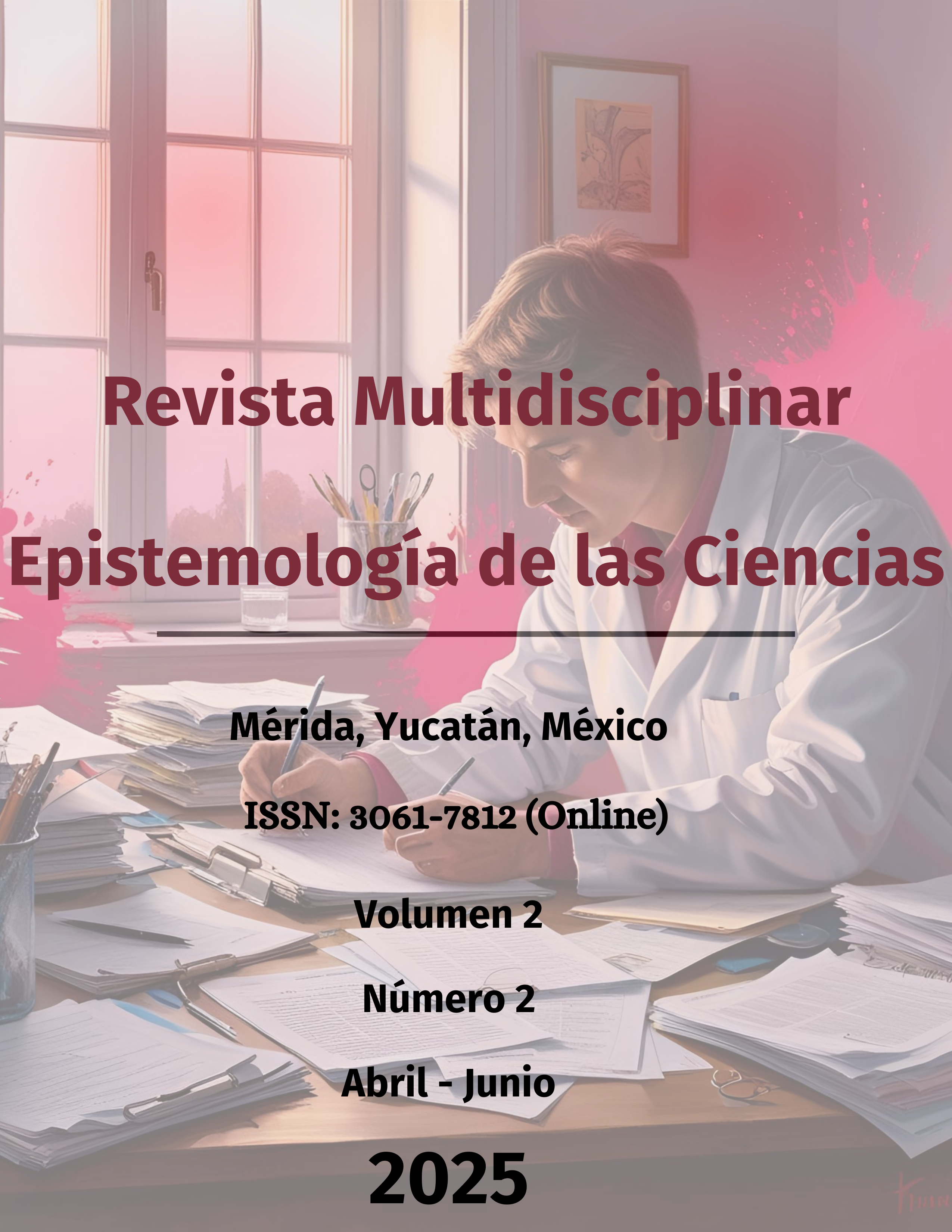The conclusions of a mixed longitudinal research: towards a method in the preparation of joint exhibition tables
DOI:
https://doi.org/10.71112/s5fsd617Keywords:
mixed methods research, conclusions, joint exhibitions, qualitative, quantitativeAbstract
Researchers who are in the phase of integrating the results to generate the discussions and conclusions of their mixed research, or for those people who are dedicated to training these future researchers know some drawbacks when research with the mixed method, like integration of qualitative and quantitative data. An exhaustive search lets found characteristics, repetitive patterns and basic elements to write the deductions that come from the data obtained in mixed research. There are tables called joint displays, which allow quantitative and qualitative data to be combined to generate statements, inferences, or declarations about the intersection of the data obtained. To confirm the efficiency, the experience obtained when developing tables of joint exhibitions in a mixed design psychological investigation is presented and with this, establish a model for the design and elaboration of joint displays.
Downloads
References
Álvarez-Gayou, J. L. (2003). Cómo hacer investigación cualitativa: fundamentos y metodología. Paidós.
Argudín, Y., & Luna, M. (2006). Aprender a pensar leyendo bien. Paidós.
Babatina, C. A. (2017). Investigación cuantitativa. Areandino. https://core.ac.uk/download/pdf/326424046.pdf
Borda, M., Tuesca, F., & Navarro, E. (2013). Métodos cuantitativos: herramientas para la investigación en salud. Universidad del Norte.
Burke, R., Russo, F., & Schoonenboom, J. (2019). Causation in mixed methods research: The meeting of philosophy, science and practice. Journal of Mixed Methods Research, 13(2), 143–162. https://doi.org/10.1177/1558689817719610 DOI: https://doi.org/10.1177/1558689817719610
Creswell, J. W., & Plano, V. L. (2007). Designing and conducting mixed methods research. Sage.
Creswell, J. W., & Plano, V. L. (2017). Designing and conducting mixed methods research (2.ª ed.). Sage.
Dawadi, S., Shrestha, S., & Giri, R. A. (2021). Mixed-methods research: A discussion on its types, challenges, and criticisms. Journal of Practical Studies in Education, 2(2), 25–36. https://doi.org/10.46809/jpse.v2i2.20 DOI: https://doi.org/10.46809/jpse.v2i2.20
Expósito, D., & González, J. A. (2017). Sistematización de experiencias como método de investigación. Gaceta Médica Espirituana, 19(2), 10–16. http://scielo.sld.cu/scielo.php?script=sci_arttext&pid=S1608-89212017000200003
Frost, N. (2011). Qualitative research methods in psychology: Combining core approaches. McGraw-Hill.
Gómez, D., & Bowater, D. (2015). Estadística y ciencia: investigación cuantitativa en diversas disciplinas. Fontamara.
González, F. (2017). Estadística aplicada en psicología y ciencias de la salud. Manual Moderno.
Guetterman, T. C., Fabregues, S., & Sakakibara, R. (2021). Visuals in joint displays to represent integration in mixed methods research: A methodological review. Journal of Mixed Methods Research, 5(1), 1–8. DOI: https://doi.org/10.1016/j.metip.2021.100080
Guetterman, T. C., Fetters, M. D., & Creswell, J. W. (2015). Integrating quantitative and qualitative results in health science mixed methods research through joint displays. Annals of Family Medicine, 13(6), 54–61. https://doi.org/10.1370/afm.1865 DOI: https://doi.org/10.1370/afm.1865
Hatani, F. (2015). Analyzing high-profile panel discussion on global health: An exploration with MAXQDA. Forum: Qualitative Social Research, 16(1), 1–20. https://www.qualitative-research.net/index.php/fqs/issue/view/51
Hernández Chávez, A. (2023). Factores de deserción terapéutica asociados al tratamiento psicológico en mujeres en situación de violencia [Tesis de doctorado, Universidad Marista de Guadalajara]. https://doi.org/10.13140/RG.2.2.16912.83204
Hernández-Sampieri, R., & Mendoza, C. P. (2018). Metodología de la investigación: Las rutas cuantitativa, cualitativa y mixta. McGraw-Hill.
Hesse-Biber, S. N. (2010). Mixed methods research. The Guilford Press.
Hesse-Biber, S. N., & Burke, J. (2015). The Oxford handbook of multimethod and mixed methods research inquiry. Oxford University Press. DOI: https://doi.org/10.1093/oxfordhb/9780199933624.001.0001
Kuckartz, U. (2014). Mixed methods: Methodologie, forschungsdesigns und analyseverfahren. Forum: Qualitative Sozialforschung, 16(1), Art. 16. https://www.qualitative-research.net/index.php/fqs/article/view/2289/3763 DOI: https://doi.org/10.1007/978-3-531-93267-5
Littman, M. L., Ajunwa, I., Berger, G., Boutilier, C., Currie, M., Doshi-Velez, F., Hadfield, G., Horowitz, M. C., Isbell, C., Kitano, H., Levy, K., Lyons, T., Mitchell, M., Shah, J., Sloman, S., Vallor, S., & Walsh, T. (2021). Gathering strength, gathering storms: The one hundred year study on artificial intelligence (AI100) 2021 study panel report. Stanford University. http://ai100.stanford.edu/2021-report
Martínez, H. (2012). Metodología de la investigación. Cengage Learning. https://elibro.net/es/ereader/umgvirtual/39957?page=123
Monje, C. A. (2011). Metodología de la investigación cuantitativa y cualitativa: Guía didáctica. Universidad Surcolombiana. https://www.uv.mx/rmipe/files/2017/02/Guia-didactica-metodologia-de-la-investigacion.pdf
Mora-Ríos, J., & Flores, F. (2012). Intervención comunitaria, género y salud mental: Aportaciones desde las teorías de las representaciones sociales. En N. Blazquez, F. Flores, & M. Ríos (Eds.), Intervención comunitaria, género y salud mental (pp. 359–377). Universidad Nacional Autónoma de México.
Neill, D. A., & Cortez, L. (2018). Procesos y fundamentos de la investigación científica. Utmach. http://repositorio.utmachala.edu.ec/bitstream/48000/14232/1/Cap.4-Investigaci%C3%B3n%20cuantitativa%20y%20cualitativa.pdf
Nessle, C. N., Ghazal, L. V., Choi, S. W., & Fetters, M. D. (2023). Joint display of integrated data collection for mixed methods research: An illustration from a pediatric oncology quality improvement study. Annals of Family Medicine, 21(4), 347–357. https://doi.org/10.1370/afm.2985 DOI: https://doi.org/10.1370/afm.2985
Ñaupas, H., Mejía, E., Novoa, E., & Villagómez, A. (2014). Metodología de la investigación cuantitativa-cualitativa y redacción de tesis. Ediciones de la U. https://www.lopezgalvezasesores.com/descargas/metodologia_investigaci%C3%B3n.pdf
Pagano, R. R. (2011). Estadísticas para las ciencias del comportamiento. Cengage Learning.
Rodríguez Salazar, T. (2007). Sobre el estudio cualitativo de la estructura de las representaciones sociales. En T. Rodríguez & M. L. García (Eds.), Representaciones sociales: teoría e investigación (pp. 157–188). Universidad de Guadalajara. https://taniars.wordpress.com/wp-content/uploads/2007/05/sobre-el-estudio-cualitativo-de-la-estructura-de-las-representaciones-sociales.pdf
Salgado, A. C. (2007). Investigación cualitativa: Diseños, evaluación del rigor metodológico y retos. Liberabit, 13(1), 71–78. https://www.redalyc.org/articulo.oa?id=68601309
Shan, Y. (2021). Philosophical foundations of mixed methods research. Philosophy Compass, 17(1), 1–12. https://doi.org/10.1111/phc3.12804 DOI: https://doi.org/10.1111/phc3.12804
Shan, Y. (2024). Philosophical foundations of mixed methods research: Dialogues between researchers and philosophers. Routledge. DOI: https://doi.org/10.4324/9781003273288
Shaughnessy, J. J., Zechmeister, E. B., & Zechmeister, J. S. (2012). Research methods in psychology. McGraw-Hill.
Svodoba, E. (2023). Value added by using joint displays in mixed methods research [Tesis doctoral, University of Nebraska-Lincoln]. https://digitalcommons.unl.edu/cgi/viewcontent.cgi?article=1048&context=dissunl
Universidad Nacional Autónoma de México. (2022). Vigilancia tecnológica en ciberseguridad (Boletín Núm. 1). https://www.icat.unam.mx/wp-content/uploads/2022/09/Vigilancia_Tecnologica_en_Ciberseguridad_Boletin.pdf
Willig, C. (2008). Introducing qualitative research in psychology: Adventures in theory and method. McGraw-Hill.
Downloads
Published
Issue
Section
License
Copyright (c) 2025 Multidisciplinary Journal Epistemology of the Sciences

This work is licensed under a Creative Commons Attribution 4.0 International License.











